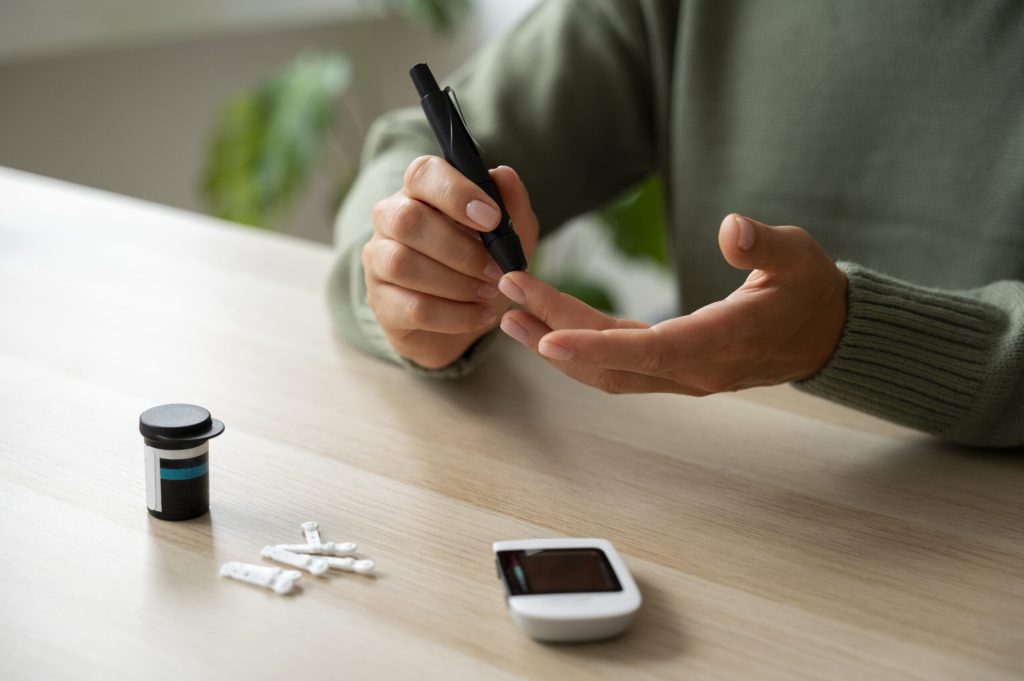After eating, get moving for at least ten minutes.
Activating your muscles is one of the best ways to lower blood sugar levels after a meal, as our muscles utilise glucose for energy. Following a meal, blood sugar rises as glucose enters the bloodstream. However, as soon as you exercise or move your muscles, the glucose is absorbed by the muscle tissues, which lowers your blood sugar. This impact can be achieved by using your muscles in any way after a meal—walk, dance, bike ride, clean your house, vacuum, walk up and down stairs, or do anything else that gets them moving.
When you eat, start your meal with vegetables.
 Starting your meal with vegetables significantly reduces the amount of glucose that is absorbed from the remainder of your meal. Eat your veggies first or have a salad for an appetiser before finishing the remainder of your meal. A considerably lower blood sugar surge after eating vegetables initially will reduce cravings and crashes during the day.
Starting your meal with vegetables significantly reduces the amount of glucose that is absorbed from the remainder of your meal. Eat your veggies first or have a salad for an appetiser before finishing the remainder of your meal. A considerably lower blood sugar surge after eating vegetables initially will reduce cravings and crashes during the day.
Save sweets for last when you eat anything substantial.
Assuming you desire anything sweet, such as a cookie, remember that we are all human and occasionally crave a small dessert. Having something sweet at the end of your meal, rather than on an empty stomach, is the easiest method to keep your blood sugar under control after eating it. Consuming it following a meal can mitigate the rise in blood sugar levels. If you consume it, however, on an empty stomach, it is likely to cause a blood sugar spike that will increase your desire for sweets. Consequently, eat something sweeter at the end of your meal if you desire it. Naturally, this does not give you permission to eat more candy. Desserts and sweets should only be consumed occasionally as treats.
Sleep for 7 to 9 hours every night.

Our bodies need sleep to properly manage blood sugar levels. Research has shown that irregular sleep habits affect the way glucose is metabolised, which can raise blood sugar levels the following day. Individuals with sleep restriction exhibit a poorer insulin response to meals, which raises blood glucose increases. In one study, those who slept for less than eight hours had greater levels of insulin and glucose after eating breakfast.[1]
For instance, you might experience a typical blood sugar reaction to fruit in the morning if you got a good night’s sleep. But if you had a bad night’s sleep the previous night, that same fruit might cause a far higher blood sugar response.
This result—that insulin resistance is more prevalent in sleep-deprived individuals—is supported by additional research.[2–3] Sleep deprivation can also impact our hormone levels, particularly those related to hunger and fullness. Moreover, it may exacerbate insulin resistance, weight gain, impaired glucose regulation, and increased food intake.[4]
Include vinegar in your food
A tablespoon of vinegar taken before a meal will reduce the meal’s glucose and insulin rises by 20%, although this may sound a little strange.[5–6] Furthermore, in a research, individuals with prediabetes who drank an apple cider vinegar (ACV) beverage with two tablespoons of vinegar experienced a 16-point decrease in their fasting blood sugar levels in just one week.[7] Moreover, a third trial randomly assigned participants with diabetes to one of three groups. Two tablespoons of vinegar given twice a day, two dill pickles, or a tiny vinegar pill were given to each group. The A1c levels of the vinegar group significantly decreased.[8]
Hence, consuming some vinegar prior to eating can really aid to flatten your blood sugar levels. You can use whatever vinegar you like because they are all equal in their functionality. For instance, instead of drinking it straight, you might dilute one tablespoon of apple cider vinegar in a glass of water, or you could use balsamic vinegar to make a salad dressing if you’d rather not drink it.
Note that the effects of similar supplements, such as apple cider gummies, are not the same. We suggest Braggs Apple Cider Vinegar as the best apple cider vinegar available.
In summary, the following are 5 tips to help reduce blood sugar after eating:
After eating, get up and move for ten minutes or more.
Prioritize eating your vegetables during a meal.
Eat your sweets last, after you’ve finished your dinner.
Sleep for seven to nine hours every night.
Include vinegar in your food.

